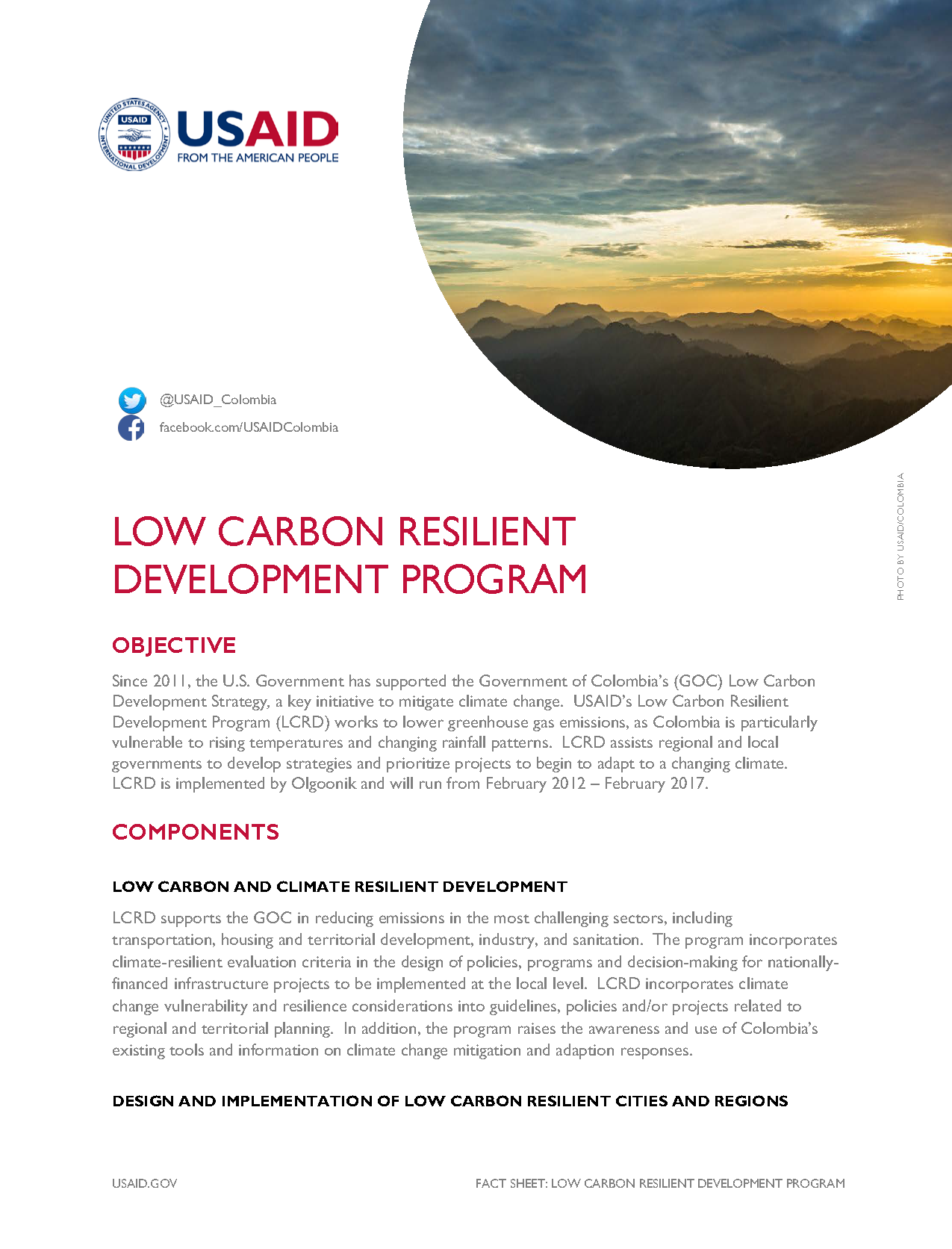Low Carbon Resilient Development Program ![]() (pdf - 146k)
(pdf - 146k)
OBJECTIVE
Since 2011, the U.S. Government has supported the Government of Colombia’s (GOC) Low Carbon Development Strategy, a key initiative to mitigate climate change. USAID’s Low Carbon Resilient Development Program (LCRD) works to lower greenhouse gas emissions, as Colombia is particularly vulnerable to rising temperatures and changing rainfall patterns. LCRD assists regional and local governments to develop strategies and prioritize projects to begin to adapt to a changing climate. LCRD is implemented by Olgoonik and will run from February 2012 – February 2017.
COMPONENTS
Low Carbon and Climate Resilient Development
LCRD supports the GOC in reducing emissions in the most challenging sectors, including transportation, housing and territorial development, industry, and sanitation. The program incorporates climate-resilient evaluation criteria in the design of policies, programs and decision-making for nationally-financed infrastructure projects to be implemented at the local level. LCRD incorporates climate change vulnerability and resilience considerations into guidelines, policies and/or projects related to regional and territorial planning. In addition, the program raises the awareness and use of Colombia’s existing tools and information on climate change mitigation and adaption responses.
Design and implementation of Low Carbon Resilient Cities and Regions
LCRD assists local authorities and stakeholders to integrate low carbon emissions strategies and climate resilient measures into development priorities, and support their implementation through detailed designs. LCRD works with intermediate cities to help accelerate or unlock local investments and strengthen long-term climate-oriented local planning processes. For adaptation to a changing climate, LCRD carries out an initial participatory assessment to identify challenges, prioritize geographies, and develop adaptation strategies in both rural and urban settings. For emissions mitigation, the program supports detailed designs of approved mitigation and adaptation options. Support includes providing feedback and sharing lessons learned with local and national stakeholders and providing inputs for national decision making, policy formulation, and local planning processes. LCRD also supports institutional capacity building for city planning on issues, such as water use and payment for environmental services.
Cross-cutting Support
All LCRD-related activities address monitoring and reporting efforts in tracking progress towards development with lower emissions and the design of methodologies to better understand vulnerability indicators in local settings. At both the national and subnational levels, the program helps in the design phase to address possible financing schemes for the proposed measures or interventions with the aim to involve, not only public, but also private funding. LCRD also creates and enhances technical expertise of government representatives through mechanisms such as workshops, training, and dissemination of relevant information, among others.
RESULTS
- Supported the GOC in its commitment to the United Nations Framework Convention on Climate Change to reduce greenhouse gas (GHG) emissions by 20 percent by 2030 with targeted studies in the transport, waste, agriculture, forestry and other land use sectors.
- Supported the integration of low carbon emission development strategies in the National Development Plan 2014-2018.
- Assisted in the development of the Climate Change Plan Huila 2050. The Plan prioritizes five areas: intelligent management of water resources, biodiversity and ecosystem services, agricultural production and food security, energy resources, and resilient surroundings.








Comment
Make a general inquiry or suggest an improvement.